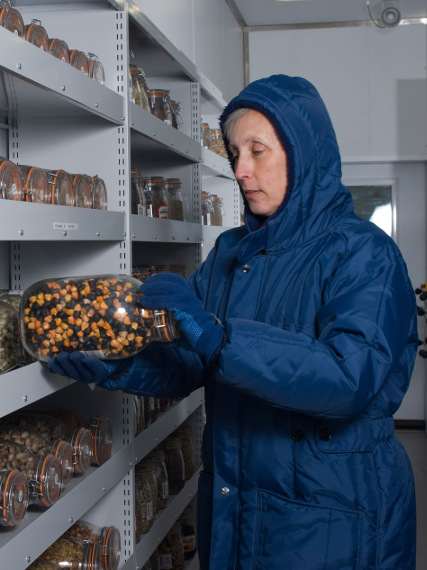CONTRIBUTION
“The plant biodiversity crisis is huge. Two in five plants are threatened with extinction, and all our lives depend on plants. The problem couldn’t be more serious.” Ecologist Elinor Breman, Senior Research Leader of the Millennium Seed Bank Project, sums up the climate of alarm that catalyzed the setup in the year 2000 of this global seed bank at the Wakehurst site of the Royal Botanic Gardens, Kew (United Kingdom). “The project,” she explains, “started 20 years ago, but in fact evolved out of more than thirty years previous experience in seed physiology and biology at the Kew laboratories,” which employ over 300 scientists.
Today, the Millennium Seed Bank (MSB) holds some 2.5 billion seeds from 190 countries, including Spain. Through its global network of partner organizations, the bank has already safeguarded over 46,000 species, equating to 16% of the world’s seed plants. For Breman, the key to its success has been international cooperation: “None of this would have been achievable,” she says, “without working with the fantastic organizations all over the globe who see the need to conserve their native flora and have joined us in the project.”
The MSB is not a single-site operation, but rather a network of interconnected banks located all across the world. These partner seed banks store material in their own countries, and send part of their collections to the MSB, where they are kept in cold storage rooms at 20 below zero. “The seeds we bank at our Kew site,” explains Breman, “are sort of a safety back-up, so if something goes wrong in-country, we can always repatriate material to them.”
In deciding which seeds to bank, the normal course is to prioritize the most threatened species. In fact, the MSB holds the seeds of species that are unfortunately now extinct in the wild. “Once a plant is gone, it is gone forever, but the seed bank means we have the opportunity not only to preserve it for now, but also for future generations.”
A cornerstone of the project, singled out by the jury, is the training of specialized seed storage staff. In its twenty-year existence, the Millennium Seed Bank Partnership has trained more than 2,000 people in a hundred countries to ensure that seeds are stored under the highest standards of efficiency and security.
“Training is central,” Breman affirms. “It is one of the things that keeps the worldwide partnership together, and one of the major things Kew has to offer our partners from its own knowledge base. Some organizations within the network have state-of-the-art facilities, but others have virtually no expertise or resources, so our aim is to progress those with less experience and help them arrive at a place where they can store material to international standards.”
But the MSB is not only making a salient contribution to the preservation of endangered plant species, it is also a leading-edge laboratory for research on plant biodiversity, with potential applications of enormous interest in the current climate crisis. Alexandre Antonelli, Science Director at Kew, offers the example of the coffee plant, describing how varieties studied in Kew’s labs have been found to be “more resistant to drought and heat waves, able to tolerate temperatures up to 6 degrees higher.”
In sum, the Millennium Seed Bank is not only helping to conserve plant biodiversity worldwide. It is also, says Breman, “providing opportunities to find solutions to global challenges like climate change, through holding and studying this precious material.”
MORE
Millennium Seed Bank
